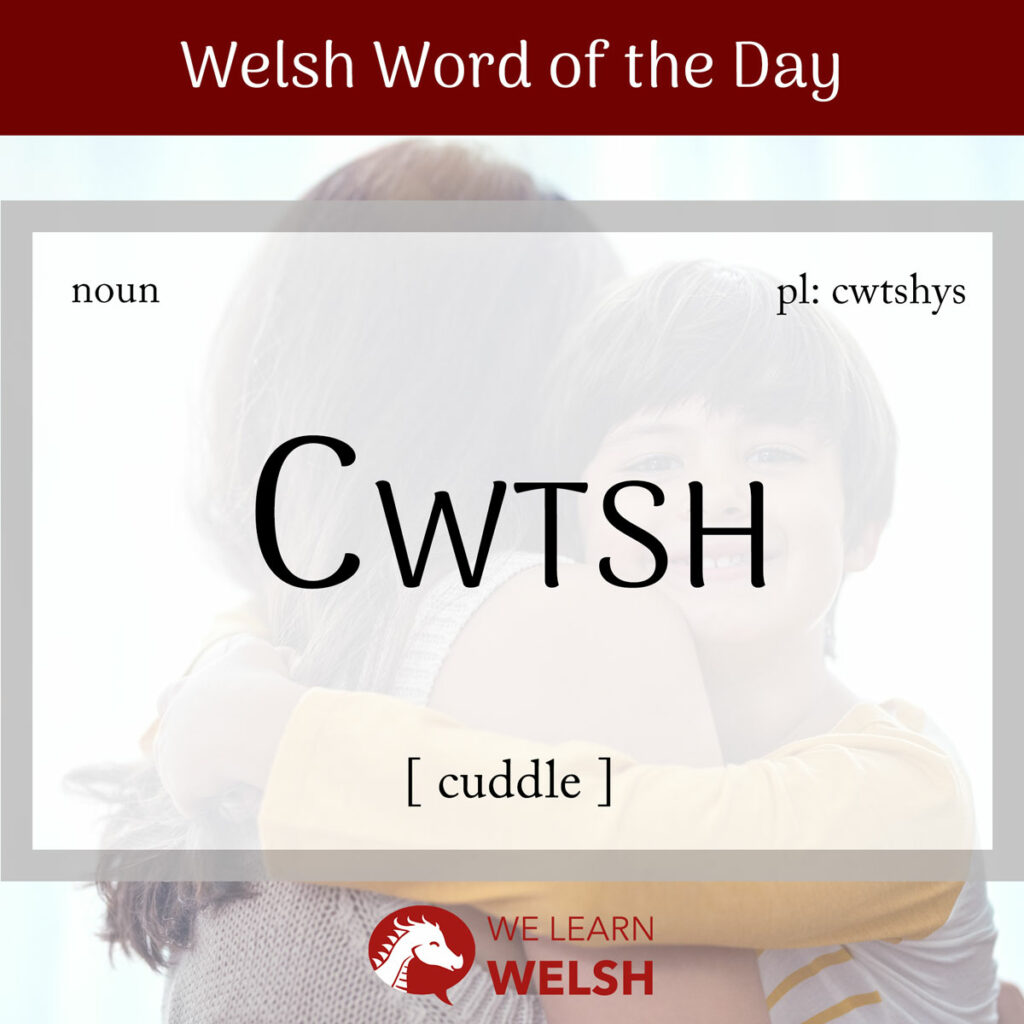It’s widely known that many Welsh speakers naturally blend Welsh and English in their daily lives—not just switching between languages from one conversation to the next, but even within sentences, and sometimes in the middle of a single word!
One such word, that’s arguably equally Welsh and English, is the famous cwtsh (cuddle).
cwtsh
cuddle
True to its mixed linguistic heritage, the most commonly accepted plural is the English-sounding yet Welsh-looking cwtshys (cuddles). However, since cwtsh is a highly colloquial word—one you won’t often find in Welsh dictionaries—there’s no need to be too rigid about its plural form. Many people also use cwtshau or cwtshiau instead.
It’s fairly well agreed upon, though, that cwtsh is a masculine noun, perhaps because other, more formal translations of hug and cuddle are also masculine. Here is how it mutates:
Soft mutation
gwtsh
Nasal mutation
nghwtsh
Aspirate mutation
chwtsh
Of course, you can use cwtsh as a verb as well as a noun; as you might have guessed, it becomes cwtsho or cwtsio. Often, especially in South Wales, this gets expanded to cwtsio lan (to hug up).
Now, before we move forward, let’s talk briefly about how this word is spelt. Normally, the noise sh is spelt si in Welsh, almost without exception. Clearly, this isn’t the case here.
The reason the si spelling isn’t used in cwtsh isn’t because of its English influence, as you might expect. It’s just that sh sounds aren’t common at the end of Welsh words, so si as the final two letters looks confusing, as if it should be pronounced coot–see. So we borrow an Anglicised spelling for words that do end in sh sounds.
It’s also often spelt cwtch, especially by people who primarily speaking English. This makes sense because a lot of English words end in –tch and the tsh sound at the end of this word does sound a lot like the English ch.
However, since ch in Welsh is pronounced as in loch, I find this spelling quite confusing. That’s why I’ve opted for cwtsh in this article. While sh isn’t a typical letter combination in Welsh, it’s still a better choice than ch, which could be misleading in a Welsh context.
Dere ‘ma a rho gwtsh i fi!
Come here and give me a hug!

The most commonly known meaning of this word, and the main subject of this article, is cuddle. But cwtsh in Welsh actually originally meant a cubbyhole. In this sense it’s mostly used in the South, although people will understand what you mean in the North too. It’s a borrowing from couche, a Middle English word that evolved into today’s couch.
One interesting coincidence is that a synonym of cwtsh as hiding place is cuddle – pronounced keeth-leh. As you might have noticed, this is the same spelling as the English word cuddle, bringing us right back around to cwtsh!
How cwtsh as a hiding place or secret cosy recess became cwtsh as a loving hug isn’t completely clear. But it would certainly have been a natural, colloquial evolution, and it’s easy to imagine these meanings blurring into each other. After all, doesn’t a hug from a loved one sometimes feel like the best place to cuddio (hide) from the world?
‘Dyn ni’n cwtsio lan a gwylio ffilm.
We’re cuddling up and watching a film.
Don’t think that Welsh’s cuddly vocabulary is limited to just the one word, though.
- cofleidio / coflaid = to embrace / an embrace
- gwasgu = to squeeze
- caru = to love
- cusanu / cusan = to kiss / a kiss
- swsu / swsan / sws = a kiss (mostly Northern)
- hyg = hug
- cydl = cuddle
- anwesu / anwylo = to cuddle / to pet
- mwythau = cuddles and kisses (Northern)
- maldod / magad = cuddles and kisses (Southern)
In the last two cases, the words would usually be paired with rhoi (to give) if you wanted to use them as verbs – for example, rhoi mwythau means to give someone cuddles and kisses.
Another option is caru mawr or cariad mawr. While these don’t directly translate to cuddle, they roughly mean big love. In North-West Wales, many people use the phrase rhoi caru mawr (giving big love) to describe affectionate hugging and kissing.
Similarly, the word carad, a colloquial form of cariad (love), is used synonymously with magod and maldod in the South.
Mae Mam eisiau cusan a chwtsh.
Mum wants a kiss and a cuddle.
Although cwtsh originally came from De Cymru (South Wales), it’s now widely used and understood across the whole of Wales—and even beyond, in England too. It’s a word that Welsh speakers use naturally, regardless of whether they’re speaking Welsh or English, and even those with little or no Welsh often know and use it.
It’s a truly bilingual word, and one of the few Welsh words that English speakers tend to recognise. Isn’t it wonderful that yr iaith Gymraeg (the Welsh language) is best known for a word as cysurus (comfortable) and cysurlon (comforting) as the language itself?

